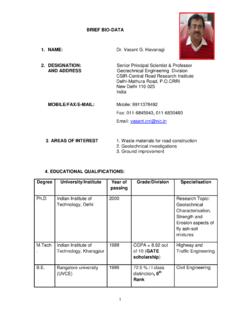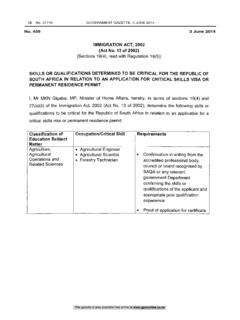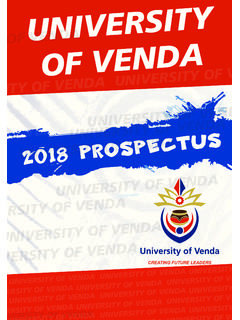Transcription of President’s Message Brad Agius and Forestry). MAWS worked ...
1 Presented for March 23, 2017 The Obligate Volume 23, The Obligate is published by the Maine Association of Wetland Scientists. Submissions are encouraged. Assembled by L. Leclerc February 2017 President s Message Brad Agius Dear MAWS Members, It has been a tremendous honor to serve you as the MAWS President over the past two years. I am grateful for the opportunity to get to know many of you and have appreciated your support, input and feedback. We have shared many successes and laid the groundwork for several new initiatives. When I began my tenure in 2015, I outlined five focal areas to keep us poised for the challenges and opportunities ahead: 1) education, 2) science, 3) outreach, 4) partnerships, and 5) membership.
2 Together, we strengthened each of these areas. For example, we expanded our research stipend awards by 50%, grew our membership by 9%, and increased our account balance by 67%. We established a credit card payment system, which now allows our members and users to register online for events, pay membership dues, and purchase MAWS merchandise (find us at ). This new system allows for real-time record keeping and helps us better anticipate event participation. In its first year, the majority of MAWS Annual Meeting and Winter Conference attendees opted to register through the online system.
3 We expect this easier payment and registration system will bolster interest and participation in MAWS events. We continue to grow our outreach efforts through the MAWS website, email list serve, Obligate newsletters, and Facebook page. Check these portals often to stay current on the latest wetland and natural resource information, upcoming events, proposed state and national rules and regulations, and opportunities for professional development. We co-sponsored two Sebago Lake State Park Natural Resource workshops with the Maine Association of Professional Soil Scientists (MAPSS), Maine Association of Site Evaluators (MASE), and spearheaded by Dave Rocque (Maine Department of Agriculture, Conservation and Forestry).
4 MAWS worked with the Maine Department of Inland Fisheries and Wildlife and over 100 Conservation Partner organizations to revise Maine s Wildlife Action Plan (SWAP). The Plan identifies 378 Species of Greatest Conservation Need and their habitats, including numerous species associated with wetland ecosystems. We added a poster session to the MAWS Annual Meeting and Winter Conference in 2015 and doubled participation in the 2016 session. Speaking of the Annual Meeting, it will be held at Bowdoin College on March 23rd with an exciting speaker line-up focusing on Wetlands Restoration.
5 Special thanks to our Program Chair, Sarah Watts, who is coordinating the scientific research, regulatory, and wetlands work being presented at the Annual Meeting. The Legislative Committee has reviewed and provided MAWS professional expertise on countless federal regulations and state legislative documents. In addition, the technical committee has been working on language refining wetlands of special significance in Maine Department of Environmental Protection Chapter 310: Wetlands and Waterbodies Protection, as well as developing a stream protocol.
6 I have only touched on a few of our accomplishments, which were not possible without the collaborative efforts of the entire MAWS membership. In particular, the Executive Committee, Standing Committee chairs and committee members, and many MAWS volunteers work tirelessly to keep this organization vital and engaged. I would like to give special thanks to Rod Kelshaw for his eight years as the MAWS Legislative Committee chair. While he, too, is nearing the end of his tenure, our legislative work will continue as we navigate new directives and relationships among state and federal programs.
7 I suspect this may be a very active legislative era in Maine and nationally, with the phrase drain the swamp used widely as a political rallying cry. 1 Presented for March 23, 2017 The Obligate Volume 23, The Obligate is published by the Maine Association of Wetland Scientists. Submissions are encouraged. Assembled by L. Leclerc February 2017 Over the last two years, I dedicated my tenure to being a good steward of MAWS, moving forward the ground work laid by previous leaders while incorporating new innovations and approaches. MAWS is in excellent hands, as I pass the tiller on to Danielle Tetreau, who has been a knowledgeable and enthusiastic President-Elect.
8 As I sail off into the sunset, I encourage you to get involved, stay engaged, and uphold our long-standing tradition of professional integrity. We are on the front lines of wetland stewardship, and our work is crucial to maintaining the healthy waters and lands that support us all. All the best, --Brad Incoming President s Message Danielle Tetreau (2017-2019) What a time to take the helm of an environmental group! I have hope and I have concerns. I worry that denying climate change and science (or facts in general) will affect the public s opinions of our role in studying, mapping, protecting, and permitting natural resources; but this also gives me hope that our group, as little as it is, has a place and a unique opportunity to educate our neighbors about the value of science and wetlands in this world.
9 The wetland scientists that formed our group nearly 30 years ago developed this mission statement: To institute a non-profit organization that will promote the profession and understanding of wetland science in Maine and protect the public interest by: Establishing a code of ethics and maintaining high professional standards of practice. Establishing professional qualifications and certifying those qualifications to the public. Implementing and participating in educational programs pertaining to the study of wetlands and the profession of wetland science for the Association membership and the public.
10 Supporting and contributing to the expansion of the wetland science research base. Promoting policies that contribute to the sound stewardship of wetland resources. In my time leading the group, I d like to revisit this mission and make sure that it accurately represents the group s current focus. I hope to develop a strategic plan to direct and/or refocus our work to reflect what YOU want from the organization. I d like to expand our membership and encourage active and affiliate members to join a sub-committee or CREATE a sub-committee if there isn t one you re interested in!






